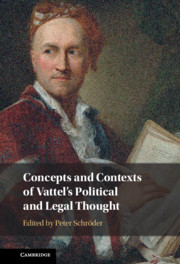Book contents
- Concepts and Contexts of Vattel’s Political and Legal Thought
- Concepts and Contexts of Vattel’s Political and Legal Thought
- Copyright page
- Contents
- Contributors
- Acknowledgements
- Concepts and Contexts of Vattel’s Political and Legal Thought
- Part I Historical and Intellectual Contexts
- Part II Concepts
- Part III Receptions
- Index
- References
Concepts and Contexts of Vattel’s Political and Legal Thought
An Introduction
Published online by Cambridge University Press: 11 June 2021
- Concepts and Contexts of Vattel’s Political and Legal Thought
- Concepts and Contexts of Vattel’s Political and Legal Thought
- Copyright page
- Contents
- Contributors
- Acknowledgements
- Concepts and Contexts of Vattel’s Political and Legal Thought
- Part I Historical and Intellectual Contexts
- Part II Concepts
- Part III Receptions
- Index
- References
Summary
The study of natural law and the law of nations in the early-modern period has expanded remarkably during the last decades. This has partly been inspired by contemporary concerns, in particular by the interest in the genealogy of human rights and the foundations of international law. However, natural law in this period has also been studied in its own historical right, with a view to understanding its intellectual sources and cultural and political uses. Early modern natural law emerged in a variety of forms at the volatile interface of theology, moral philosophy, political thought and jurisprudence. These ‘different models of natural law’ have been described ‘as conflicting ways of configuring access to ethical and political norms in the service of rival cultural–political programmes’.
- Type
- Chapter
- Information
- Publisher: Cambridge University PressPrint publication year: 2021



